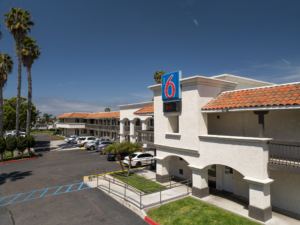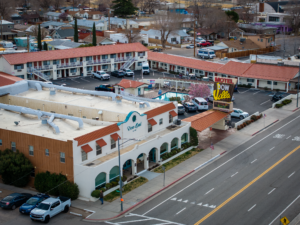Impact of pandemic on hotels to be felt for years
Impact of pandemic on hotels to be felt for years
Monday, February 1, 2021
By Thor Kamban Biberman
Like many industries throughout the world, the COVID-19 pandemic has dealt an enormous blow to the hotel industry, as noted by Atlas Hospitality Group president Alan Reay.
One of the hardest hit firms has been Sunstone Hotel Investors.
The Irvine-based firm lost $92.49 million in the third quarter last year, and more than $371 million through the first nine months of 2020.
It recently handed back the keys to the 44-story, 478-room Hilton Times Square in Manhattan within the past few weeks.
It also sold the Renaissance Los Angeles Airport for $91.5 million in December to help its balance sheet, Reay noted.
Sunstone, which owns the Embassy Suites in UTC and a majority stake in the Hilton San Diego Bayfront, is far from being alone in its struggles, according to Reay.
The famed Chateau Marmont Hotel in West Hollywood was on the verge of closing before its owners decided to turn the asset into a private club. The jury is still out on whether or not that will be a winning strategy.
Other L.A. hotels haven’t been as lucky, Reay explained, noting the 139-room Standard Hotel in West Hollywood, has already closed.
While major hotels in San Diego don’t appear to be in such trouble, Reay said the hotels next to the convention center, such as the Hilton San Diego Bayfront, the San Diego Marriott Marquis, and the Manchester Grand Hyatt, may be facing a great deal of stress that won’t necessarily go away when the pandemic is over.
“Everyone is doing Zoom meetings, so what’s that going to look like [in the future]?” Reay said.
Reay said companies and trade organizations, which may be suffering mightily during the pandemic, might simply decide it isn’t cost effective to have the big conferences that used to fill the convention center.
Currently, the San Diego Convention Center is serving as a homeless shelter. Numerous smaller hotels in the region are being converted to house the homeless as well.
Reay also wondered what will happen with business class hotels, given all the people who are now accustomed to working remotely. The good news, he said, is extended-stay hotels seem to have held their own.
Lenders, unless a project is under way, have been hesitant loan out money for hotel development.
“Unless you are under construction, it will take at least two or three years for most lending to come back,” Reay said.
Reay did say lending for destination resort hotels is likely to pick up sooner, but lending for other hotel categories could be problematic.
“Projects in planning are being deferred, or abandoned altogether,” he said, adding that even some completed hotels are delaying their openings indefinitely.
“The coastal hotels will bounce back relatively quickly.”
Reay said that Catalina is already doing a strong, if not record, business despite the pandemic. For now, however, the hotel picture continues to be ugly. One troubling sign is the fact there were more notices of default in January 2021 than there were during all of last year.
Looking beyond what is happening to the hotels themselves, Reay said he continues to be concerned about the huge loss of transient occupancy tax revenues that cities are losing because hotels are largely empty — which, in turn, will impact their ability to obtain municipal bonds.


